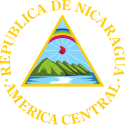Nicaraguan general election, 2001
- Nicaraguan general election, 2001
-
General elections were held in Nicaragua to elect a president and parliament on 4 November 2001.
Presidential election
Daniel Ortega lost his third successive presidential election, being beaten by Enrique Bolaños of the Constitutionalist Liberal Party.
Results
Parliamentary election
The Constitutionalist Liberal Party also won the parliamentary elections, taking over half the vote and 48 of the 92 seats.
Results
e • d Summary of the 4 November 2001 National Assembly of Nicaragua election results
| Parties |
Votes |
% |
Seats |
| National |
Departmental |
Total |
| Constitutionalist Liberal Party (Partido Liberal Constitucionalista) |
1,216,863 |
52.6% |
11 |
38 |
49 |
| Sandinista National Liberation Front (Frente Sandinista de Liberación Nacional) |
915,417 |
42.6% |
9 |
30 |
39 |
| Conservative Party of Nicaragua (Partido Conservador de Nicaragua) |
29,933 |
4.8% |
0 |
3 |
4 |
| Total valid votes(turnout 75%) |
2,042,524 |
100.0 |
20 |
70 |
92 |
| Invalid votes |
82,172 |
|
| Total votes |
2,124,696 |
| Source: Consejo Supremo Electoral, Rulers and Adam Carr |
Wikimedia Foundation.
2010.
Look at other dictionaries:
Nicaraguan general election, 2006 — Nicaragua This article is part of the series: Politics and government of Nicaragua Constitution President … Wikipedia
Nicaraguan general election, 2011 — Nicaraguan presidential election, 2011 2006 ← November 6, 2011 (2011 11 06) … Wikipedia
Nicaraguan general election, 1984 — A general election was held in Nicaragua on 4 November 1984, to elect a president and parliament. Approximately 1.2 million Nicaraguans voted,[1] representing a 75% turnout, with 94% of eligible voters registered.[2] The elections were generally… … Wikipedia
Nicaraguan general election, 1996 — A general election was held in Nicaragua to elect a president and parliament on 20 October 1996. Contents 1 Presidential election results[1] 2 Legislative election [2] 3 References … Wikipedia
Nicaraguan general election, 1947 — General elections were held in Nicaragua to elect a president and parliament on 2 February 1947. The agreement between the Conservatives and the Independent Liberals, signed on 17 August, pledged both parties to overthrow the dictatorship,… … Wikipedia
Nicaraguan general election, 1957 — General elections were held in Nicaragua to elect a president and parliament on 3 February 1957. “Luis Somoza Debayle formalized his grip on the presidency through fraudulent elections in February 1957 which were boycotted by all the opposition… … Wikipedia
Nicaraguan general election, 1950 — General elections were held in Nicaragua to elect a president and parliament on 21 May 1950. In April, Anastasio Somoza García and Emiliano Chamorro Vargas sat down and signed the Pacto de los Generales, thus laying the basis for a new political… … Wikipedia
Nicaraguan general election, 1990 — A general elections were held in Nicaragua to elect a president and parliament on 25 February 1990. William I. Robinson wrote that massive foreign interference completely distorted an endogenous political process and undermined the ability of the … Wikipedia
Nicaraguan general election, 1924 — A general elections were held in Nicaragua to elect a President, half of the Deputies and 1/3 the of the Senators on 5 October 1924. When the President Diego Manuel Chamorro died in office on 12 October 1923 Vice President Bartolomé Martínez, a… … Wikipedia
Nicaraguan general election, 1963 — A general elections were held in Nicaragua to elect a president and parliament on 3 February 1963. “Evidence of massive impending fraud caused the Traditional Conservative Party to abandon its loyalist stance of the previous decade and to boycott … Wikipedia

 Elections in Nicaragua
Elections in Nicaragua